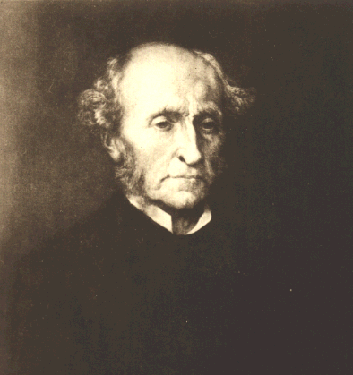
Mill
John Stuart Mill was one of the most crucial thinkers of the 19th century. He wrote on logic, economics, political philosophy, and religion. His work, Utilitarianism, provides a way of thinking that promised those who employ it to maximize their happiness. Mill’s text is well paired with the reading, Chapter 4: Utilitarianism, from What is this Thing Called Ethics.
Mill establishes the principle of utility by stating that “actions are right in proportion as they tend to promote happiness, wrong as they tend to produce the reverse of happiness. By happiness is intended pleasure, and the absence of pain; by unhappiness, pain, and the privation of pleasure. (Mill 77). Simply, acts that produce pleasure or prevent pain are the most desirable. Is it right, however, to streamline life’s purpose to whether or not an action gives pain or pleasure? The quality of different pleasures tells one how to choose between two courses of action.
The utilitarian will perform actions based upon their benefit to mankind. If X and Y are two actions or decisions, and Y produces more happiness for mankind, then utilitarians will concur that Y is to be performed regardless of most other circumstances. This can be beneficial, as utilitarianism seems to appeal to a broad spectrum of people due to the fact it prioritizes the interests of the many (Bennett 56). It promotes impartiality and equality by saying that the happiness of one person is just as valuable as that of any other. By weighing each person’s happiness as a value of one, no less and no more, utilitarianism helps address moral questions and remove prejudices based in birth, sex, race, and social rank. Utilitarianism does not set moral limits on what we can do, it only says to maximize the social good by performing cost benefit analyses on decisions (Bennett 58). During my initial reading, I easily agreed with this view. Like subjectivism initially seemed good until Hitler was mentioned, I knew I needed to view both extremes before deciding whether I act as a utilitarian.
As I quickly discovered, utilitarianism can lead to disturbing consequences in certain situations. Bennett writes about a situation in which a person or party who is universally believed to be guilty but is actually innocent does not benefit from utilitarianism. Assuming that the true perpetrator of the crime died, how should a utilitarian police chief act in the best interest of the society? According to utilitarianism, the two possible actions would be either doing nothing or punishing the innocent party. Assuming there was no danger of the party’s innocence ever coming to light, and if nothing is X and punishing is Y, X = no effect and Y = some positive outcome – such as the “rallying” of a community or the beginning of a healing process after a shooting spree or mass murder. Then, Y will be employed because it is more beneficial for the community as a whole. Although the example is quite specific, this still leads to the conviction of an innocent party. Therefore, utilitarianism leads to immoral outcomes. Due to this lack of moral outcomes, I cannot consider myself a true, pure utilitarian.
An answer to the criticisms of utilitarianism, I thought, could be rule-utilitarianism. Rule-utilitarians agree that an action is right if and only if it falls under a rule, the general following of which would result in greater utility than an alternative available rule (Bennett 64). In reality, humans do not calculate every single decision they make. Humans use patterns (Bennett 63) of behavior, called habits, to help do most of the “calculations” instead of starting from the beginning each time. The idea is to “always assess the consequences of your actions and try to act optimally” (Bennett 65). However, rule-utilitarianism has been called too contingent or accidental in the way it determines what is moral and what is not.
A current example of utilitarian ethics is the push human cloning. Judith Daar, the author of the article The Prospect of Human Cloning, uses an example in which a family that suffered the loss of a child would benefit from cloning. The genetic similarities between the child who passed and the new child would be impeccable, and this may begin to mend the families’ hearts. Daar cites studies that show there is traction for a human cloning movement, underscored by parents and families that have lost young ones in child birth or at young ages (Daar 16). A utilitarian would have to weigh the difference between the utility received by the family for having a similar child versus the unhappiness or discrimination that may come about from a whole new race (clones).
Works Cited
Mill, John Stuart, and Oskar Piest. Utilitarianism. Indianapolis: Bobbs-Merrill, 1957. Print.
Bennett, Christopher. “Chapter 4: Utilitarianism.” What Is This Thing Called Ethics? London: Routledge, 2010. Print.
Daar, Judith F. “The Prospect of Human Cloning: Improving Nature or Dooming the Species?” Seton Hall Law Review 33 (2003): pp. 1-90. Web.

4 responses to “Utility – The Greatest Happiness Principle”